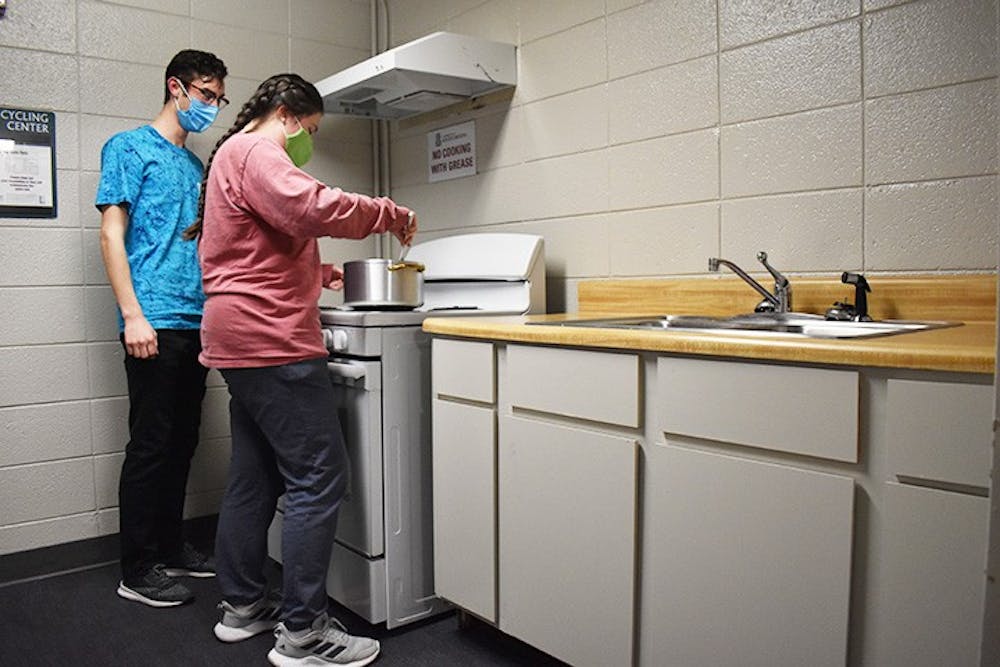Few things can bring people together better than food. For students, cooking can be a great way to entertain friends, relax and enjoy a homemade snack. When hunger or boredom strikes, check out a residence hall kitchen.
Jade Hannan, a first-year biology and French student, uses cooking as a way to spend time with her friends. For her, shareable items are ideal.
“A lot of times on the weekend, I’ll make chocolate chip pancakes, which is always fun,” Hannan said.
Cooking for yourself allows you to control how your food tastes. Hannan said her pancakes are typically very chocolate chip heavy and that her chocolatey creation is the superior pancake.
Baking seems to be a common hobby among collegiate chefs, such as first-year nursing student Derek Farraro, who found his baking inspiration on a television show.
“I started watching [the Great British Bake Off], and I got my friends to start watching it, so we all kind of got obsessed with it,” Ferraro said.

The show inspired him and his friends to bake a loaf of bread. They chose to bake in South Tower, as the building has a kitchen on every floor. When they began to bake, they realized they did not have enough flour.
They call them community kitchens for a reason, though: Students can help other students cook, especially because they can have a taste of the final product.
“I started asking [the Honors Residence] group chat, and [my friends] asked the South Tower group chat,” Ferraro said. “No one's responding at first, so we were about to go to CVS to grab some, and eventually someone in the South Tower [group chat] responded.”
First-year biochemistry student Dorathea Lee took to baking during the pandemic.
“I am guilty of being the girl who was like, 'Look at my first loaf of bread,' on my Snap story,” Lee said.
At USC, Lee has used her bread-baking skills and made what she thinks is a loaf perfect for a college student.
"I started using a no-knead recipe ... I found it on 'Binging with Babish,'” Lee said. “It's basically really great for college students because you can leave the bread overnight."
Lee said the simple recipe only requires flour, water and yeast and is left to rise for 24 hours before putting it in the oven.
Undecided first-year student Abigail Clarke went beyond baking and made ravioli with a side of chaos in the Capstone kitchen.
“The burners kind of slant, so my water couldn’t fill up all the way and then it was boiling, kind of, over,” Clarke said. “I did enjoy telling the story of how my ravioli almost killed me, but I thought it was a little dramatic,” Clarke said.
Students might opt not to cook because of their meal plans, but repurposing meal swipes can be thrifty and delicious.
“I've developed a system. So, I will go and get my protein from Southern Kitchen; I'll get, like, a chicken tenders; and then I'll make my veggies and rice here,” Lee said. “So, I don't have to do all of the steps of cooking, but, you know, it's still like more of a homemade meal, and it's really convenient.”
Thinking outside the box — and obtaining ingredients in an unusual way — allows students to eat what they want, even if they’re still on the meal plan.
According to Lee, students can now use a meal swipe to get basic cooking ingredients, such as potatoes and onions, at the Russell House fresh food station, which can save money that would otherwise be used at a grocery store.
The recent addition of the Fresh Lane at Russell House allows students to get fresh produce and pantry staples while on a meal plan.
Besides ingredients, students who decide to cook or bake will also need basic equipment. Ferraro suggests a cutting board, knife, pot and baking sheet.
All USC residence halls have at least one community kitchen. So, with standard kitchen tools in hand, a couple of basic ingredients and a little creativity, students can showcase their cooking skills.

